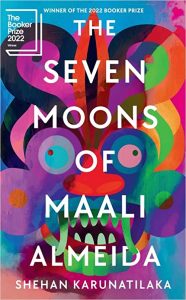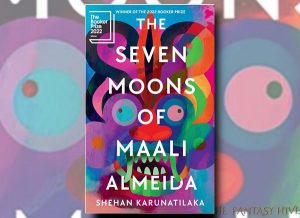THE SEVEN MOONS OF MAALI ALMEIDA by Shehan Karunatilaka (BOOK REVIEW)
“Being a ghost isn’t that different to being a war photographer. Long periods of boredom interspersed with short bursts of terror. As action-packed as your post-death party has been, most of it is spent watching people staring at things. People stare a lot, break wind all the time, and touch their genitals much too much.
Most folk think they are alone and, as usual, they are mistaken. At the very least, there are a hundred insects within spitting distance of you and a few trillion bacteria on everything you touch. And yes, some of them are watching you.
There will always be something hovering or passing through, though most things that hover and pass are as interested in you as you are in earthworms. There are at least five spirits wandering the space you’re in now. One may be reading over your shoulder.”
Shehan Karunatilaka’s second novel The Seven Moons of Maali Almeida (2022) deservedly won the Booker Prize for 2022. A wonderful and imaginative novel about a murdered Sri Lankan war photographer trying to navigate the afterlife, like all the best fantasy it’s a staggering work of imagination drawing from theology and folklore, whilst like the best literature it tells us profound and difficult truths both specific – about the civil wars and corruption plaguing Sri Lanka – and universal – about mortality and the human condition. The Seven Moons of Maali Almeida is beautifully told and vividly imagined. Karunatilaka is by turns lyrical and scathing, effortlessly shifting between mystic wonder and brutal satire, yet always retaining the warmth of humanity as he explores his damaged characters and the harsh and complex world they inhabit.
 Maali Almeida earns a living taking photographs in the most dangerous places during Sri Lanka’s civil war. This has made him many powerful enemies, but he tries not to think about that during his down time, when he spends his time frittering away his hard-earned money on gambling, drink and drugs in the dodgiest parties in Colombo, hanging out with his best friend and flatmate Jakki and his boyfriend DD, the closeted son of prominent government minister Stanley Dharmendran. This all changes when Maali suddenly wakes up in the afterlife, with no memory of how he died and his dismembered body sunk in the Beira Lake. The afterlife has its own labyrinthine bureaucracy, plus the threats of demons and undead rabble rousers. Maali wants to solve the mystery of who killed him, and to lead Jakki and DD to the secret cache of photos that could bring down the Sri Lankan government, but he has only seven days to do this in before he will no longer be able to enter the next phase of existence. Will Maali be able to solve the mystery before he is cursed to spend the rest of his existence in limbo?
Maali Almeida earns a living taking photographs in the most dangerous places during Sri Lanka’s civil war. This has made him many powerful enemies, but he tries not to think about that during his down time, when he spends his time frittering away his hard-earned money on gambling, drink and drugs in the dodgiest parties in Colombo, hanging out with his best friend and flatmate Jakki and his boyfriend DD, the closeted son of prominent government minister Stanley Dharmendran. This all changes when Maali suddenly wakes up in the afterlife, with no memory of how he died and his dismembered body sunk in the Beira Lake. The afterlife has its own labyrinthine bureaucracy, plus the threats of demons and undead rabble rousers. Maali wants to solve the mystery of who killed him, and to lead Jakki and DD to the secret cache of photos that could bring down the Sri Lankan government, but he has only seven days to do this in before he will no longer be able to enter the next phase of existence. Will Maali be able to solve the mystery before he is cursed to spend the rest of his existence in limbo?
The Seven Moons of Maali Almeida is a remarkable work of fantasy, one that imagines an afterlife informed by Sri Lankan folklore, where ghosts and demons haunt the world around us until they are able to move on. Karunatilaka’s afterlife is full of wonders, horrors and magic, but also a very human bureaucracy, where those who have already passed on to the next stage return to help administer and guide the recently deceased through all the appropriate rituals and rules of the afterlife. The novel is also a remarkable work of historical and political fiction that paints the Sri Lanka of 1990 in vivid detail, merging the fantastical world of the afterlife seamlessly with the brutal civil war, human rights abuses and ministerial corruption that characterised the period. Karunatilaka has clearly done his research, and the characters and events of the novel intersect with figures from the real world history and political sphere of Sri Lanka at the time. The novel delves into the seedy underbelly of Colombo, where gangsters are hired by ministers to dispose of inconvenient bodies and military atrocities are covered up. Karunatilaka unflinchingly examines colonialism and genocide, like his protagonist Maali shining a light where many would prefer the truth to be obscured or swept away. From the international arms dealers to the NGO that may be a charity or may be funding terrorism, this is a world of complex shades of grey where everyone’s motives are suspect and even those with good intentions can wind up causing great harm.
All this might suggest that The Seven Moons of Maali Almeida is a particularly gruelling read. Karunatilaka is able to handle heavy subjects with sensitivity and an admirable lightness of touch. The novel’s fantastical and magical elements, along with its humour, mean that the book retains a warmth throughout and never sinks into despair. Instead, the fantastical and the humorous allow Karunatilaka to tackle these upsetting subjects in a way that allows for hope. For all the senseless violence and injustice that frequently characterises the world of the living, the novel is always acknowledging a spirituality to humanity that implies that humanity is part of the numinous and the eternal. And it helps that Karunatilaka’s character work is brilliant. Maali Almeida is a wonderful character, his snide cynicism stemming from the idealism he tries to pretend he’s too worldly to subscribe to. His relationships with his best friend and his boyfriend are genuinely touching, with the novel finding space to explore the bitter loneliness and grief that comes from losing a loved one to violence. Karunatilaka peoples his novel with a vast array of diverse characters, from washed up alcoholic MI5 agents to anarchist ghosts who are fed up with how the bureaucracy of the dead treats them to horrific demons to the spirit of a tiger that wants to be reborn as a human. All of them get their time to shine, and their perspectives taken seriously.
The Seven Moons of Maali Almeida is a powerful and unforgettable read. Karunatilaka has created a novel that combines the best aspects of the fantastic with the best aspects of the literary, demonstrating how well these approaches can compliment each other when handled with skill and care. The end result is a novel that is moving and funny, frightening and entertaining, in equal measure. It’s wonderful to see such an unapologetically speculative book honoured by the Booker Prize, and one can only look forward in anticipation to whatever Shehan Karunatilaka does next.

